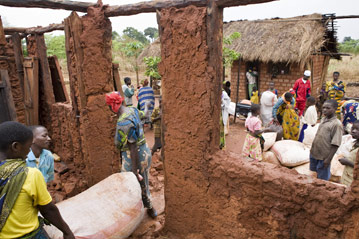Repatriation of 1972 Burundian refugees from Tanzania enters final phase
Repatriation of 1972 Burundian refugees from Tanzania enters final phase

DAR ES SALAAM, Tanzania, April 24 (UNHCR) - The final phase of the repatriation of tens of thousands of Burundian civilians who fled to Tanzania in 1972 got under way this week when a UNHCR convoy carrying almost 500 people crossed the border and arrived at a new transit centre in Burundi.
The UNHCR assisted voluntary repatriation operation, organized in cooperation with the governments of both countries, aims to end one of the world's most protracted refugee situations.
The refugee agency hopes this year to repatriate some 25,000 of the so-called 1972 Burundians, from three "old settlements," who have opted to go back home. The remaining 165,000, most of them born and raised in Tanzania, have opted to stay.
The first UNHCR return convoy of the year left the Lake Tanganyika town of Kigoma in north-west Tanzania on Wednesday carrying 473 refugees from Katumba. They had left this old settlement by train on Tuesday with their personal belongings and livestock. Some even dismantled their homes and took the construction materials back to Burundi.
Returnees who talked to UNHCR were glad to be going back home after so many years. "I feel relief in my heart, because I am finally back in my home country. This is what I longed for before I die," 76-year-old Yokoniya Ntabiye told UNHCR after arriving at the Gitara Transit Centre in southern Burundi.
But the refugees also acknowledged the debt they owed to Tanzania and the refugee agency. "I want to thank the government of Tanzania for treating us all these years with dignity, and not just as refugees," said Phillip Budogero, who was an infant when his parents fled inter-ethnic conflict in Burundi. "We have benefitted from communal services such as education and health," he added.
On arrival at the newly-built Gitara centre, the refugees underwent a medical check and were given an aid package, including cash support, food and household items. They will be transported to their home communes.
But the returnees will face many challenges in Burundi, especially because they left the country so long ago. Many will face problems reclaiming their land in the small Central African nation. For these people, UNHCR provides temporary shelter and supports the peaceful mediation of their land disputes.
As for landless returnees, the Burundian government and UN partners, including UNHCR, help them settle in integrated "peace villages." Four of these villages have been opened for hundreds of people in recent months.
The returnees arrived shortly after the last active rebel group in Burundi disbanded and converted into a political party.
The three old settlements in western Tanzania - Ulyankulu, Katumba and Mishamo - housed some 220,000 of the 1972 Burundians. Last year, more than 30,000 of them returned home after they were given the option of repatriation or local integration. The citizenship applications of those who opted to stay are now under review by the Tanzanian authorities.
The 1972 refugees differ from those who fled from Burundi to Tanzania in the 1990s and for whom UNHCR actively promotes return to Burundi. Numbering some 40,000, they are hosted at the Mtabila camp in the Kigoma region.
UNHCR has helped some 390,000 Burundian refugees return home from Tanzania since the beginning of its assisted repatration operations in 2002. When assisted and unassisted are totalled, more than 470,000 people have returned to Burundi since 2002.
By Eveline Wolfcarius in Dar Es Salaam, Tanzania and Bernard Ntwari in Gitara Transit Centre, Burundi







